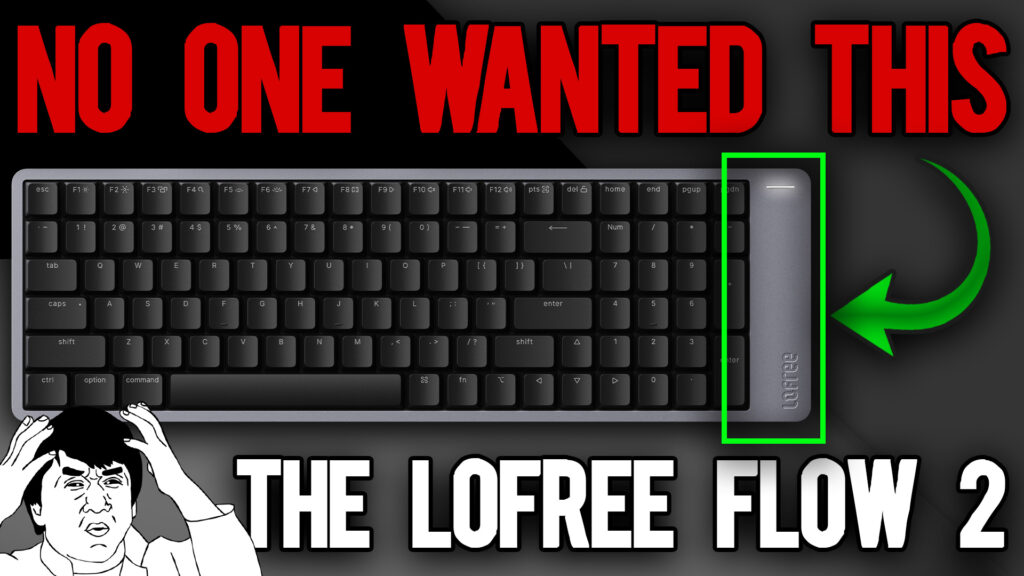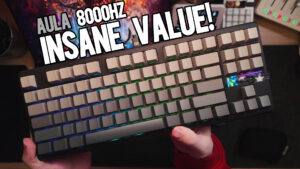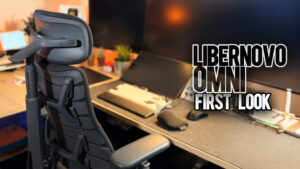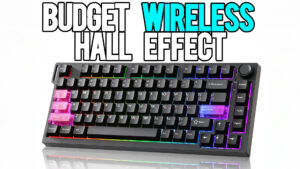Lofree Flow V2 Review – A Stunning Keyboard Held Back by a Design Misstep

Sometimes a product looks like it belongs on the cover of a design magazine… but on your desk, it just doesn’t work.
Hey everyone, it’s Tristan from Crafting Worlds—and today we’re diving deep into a keyboard I really wanted to love. The Lofree Flow V2 is the successor to the beloved Flow Lite ⌨️ and Flow 100 / Flow 100 Tactile series.
Lofree has been making some of the best-looking low-profile mechanical keyboards on the market. But this time? Form might have triumphed over function—and that’s a problem.
What is the Lofree Flow V2?
The Lofree Flow V2 is a low-profile mechanical keyboard launching on Kickstarter, available in:
- 68-key, 84-key, and 100-key layouts
- With three POM Cloud Series switches:
- Void – Silent Linear
- Surfer – Fast Linear
- Pulse – Tactile
It comes packed with features like:
- VIA/QMK support
- Upgraded PBT keycaps
- White-only backlighting with better diffusion
- A 3000mAh battery
- Bluetooth, 2.4GHz, and wired support
On paper, this board should be a knockout. But one design choice changed everything…
The Touch Bar Dilemma
There’s no way around it—the Touch Bar and right-side chin ruin the Flow V2’s usability for many.
Placed on the far right side of the board, this capacitive bar adjusts volume and brightness—but also:
- Takes up valuable mouse space
- Accidentally triggers when moving the board
- Can’t be reprogrammed or repositioned
- Makes wired use awkward with the USB-C port right next to it
In practice, it’s clumsy and frustrating. For a keyboard that markets itself as minimalist and functional, this feels like a misstep that prioritizes visuals over user experience.
Feedback Ignored, Kickstarter Risk
Here’s the kicker: Lofree’s own community raised these concerns early. Reddit, Instagram, Facebook, Discord—users gave feedback. But Lofree proceeded with the design, launching it straight into Kickstarter where the burden shifts to the consumer.
Unlike retail releases, Kickstarter means you’re assuming the risk. If the product doesn’t work for you? Tough luck.
Worse, they hid the full layout until late in the teaser cycle, relying on glam shots that didn’t show the right-side bezel. It feels… intentionally vague.
The Good: What Lofree Got Right
Despite the layout issues, there’s still a lot to love:
- Three improved switch types that are smoother and lighter than previous gens
- Gorgeous build—sleek aluminum chassis, refined finish
- Improved PBT keycaps with better shape and texture
- VIA support for remapping, macros, layers
- Crisp white LED backlighting with smooth diffusion
- Better angle and sturdy flip-out feet
All three switches feel great, especially the Void for quiet environments and Pulse for a gentle tactile bump.
The Bad: Design & Practicality Flaws
- Touch Bar = mouse collision + volume mistakes
- USB-C port placement blocks cable routing
- No switch + color configuration options
- No dongle storage (unlike previous Lofree Lite board)
- Legends are hard to read with lighting off
- Spacebar ping is noticeable on tactile model
- Kickstarter model only, no safety net
And that price bump? It’s a kicker. Especially when the original Flow 100 models are still available and arguably more usable.
Sound Test Breakdown
Let’s be clear—the Flow V2 sounds amazing. Lofree nailed acoustics again:
- Stock stabilizers are decent
- Switches are tuned well for a low-profile board
- No hollow reverb, no excessive clack
But… that spacebar ping on the Pulse switch? Yeah, it’s real. And with over a dozen screws locking this board down, modding it isn’t exactly beginner-friendly.
Unboxing: What’s Inside
- Lofree Flow V2 Keyboard (Tactile or Linear, Black or White)
- Right-angle braided USB-C cable
- Extra keycaps for Mac/Windows
- 2.4GHz dongle (but no storage space on board)
- No extras—no keycap puller, travel case, or extras
Pricing Breakdown
| Layout | Kickstarter Price | Retail Price |
|---|---|---|
| 68 Key | $89 | $129 |
| 84 Key | $99 | $189 |
| 100 Key | $109 | $199 |
The Lofree Flow 100 was $169—this is an increase for a less practical design.
Product Comparison: Flow V2 vs Flow V1 (Flow 100/84) vs Flow Lite
| Feature | Flow V2 | Flow 100/84 (Flow V1) | Flow Lite |
|---|---|---|---|
| Layouts | 68, 84, 100 keys | 84 (75%) & 100 (96%) full-aluminum low-profile youtube.com+12craftingworlds.com+12lofree.co+12 | 84 (75%) & 100 (96%) aluminium-look ABS body |
| Body Material | Full aluminum | Full aluminum | ABS plastic (lighter, more affordable) |
| Mounting Style | VIA/QMK support | Hot-swappable, gasket-mounted POM switches | Gasket-mounted with Tri‑mode wireless, 2.4 GHz, roller knob added |
| Switch Options | Void (silent linear), Surfer (linear), Pulse (tactile) | Phantom tactile, Ghost linear | Specter linear & Hades silent linear (new light POM) |
| Backlighting | Single-color white LEDs | White backlight + RGB side lights | White only, shines-through key legends |
| Stickers / Legends | Dual legends; low visibility without backlight | Sharp legends, laptop-style key shape | Improved shine-through legends |
| Wireless Modes | BT, 2.4 GHz, wired USB-C | BT & wired only | Tri-mode: Bluetooth 5.*, 2.4 GHz & wired USB-C |
| Battery & Stand | 3000 mAh; refined feet | 2000 mAh; stable aluminum stand | 2000 mAh; adjustable 3°/6° feet |
| Unique Feature | Touch Bar volume/brightness bar (bad placement) | No side bezel, hot-swap switches, fully metal body | Roller volume knob; dongle storage slot |
| Price (retail) | 68: $129 • 84: $189 • 100: $199 | ~84: $159 • 100: $169 ($139–169 on sale) | 84: $109 • 100: $119 (on Amazon sale) |
| Affordability | Most expensive | Mid-tier → premium | Best value on features & pricing |
Final Verdict: All Style, Some Struggle
The Lofree Flow V2 is a visual masterpiece that’s hampered by one major design mistake. That Touch Bar, that right-side bulk—it’s a dealbreaker for many.
This board isn’t just a keyboard—it’s a statement piece. And unfortunately, that statement might be: “We stopped listening.”
Unless you’re absolutely sold on the look, I’d recommend holding off or grabbing the Flow Lite or Flow 100 instead.
Summary by board
- Flow V2: Premium build and smooth switches, but compromised by the Touch Bar’s poor ergonomics, raised price, and limited customization.
- Flow V1 (Flow 100/84): Clean layout, full-quality aluminum, and solid acoustics at a lower price—but lacks multi‑mode wireless and VIA support.
- Flow Lite: Lightest and most affordable full-featured low-profile board, with tri‑mode wireless and shine‑through legends—but uses ABS and lacks VIA; still great value.
Verdict by Use Case
- Want the sleekest build + VIA + multi‑mode wireless? ▶️ Flow V2 (only if you can live with the Touch Bar issue).
- Crave a pure typing experience in metal without weird add-ons? ▶️ Flow V1 (100/84) is a safer choice.
- Want the best value with essential features and don’t mind ABS? ▶️ Flow Lite is ideal.
Pros and Cons Summary
Pros:
- Beautiful aluminum design
- Smooth, improved switches (Void, Surfer, Pulse)
- PBT keycaps with better shape and durability
- VIA compatibility
- Great acoustics
- Strong white LED diffusion
Cons:
- Poor ergonomic design with Touch Bar on the right
- USB placement causes desk cable issues
- Can’t pick your color/switch combo
- No onboard dongle slot
- Kickstarter model means no refunds
- Spacebar ping and no easy mod access
🗣 Final Thoughts
As a reviewer and someone who genuinely loves what Lofree usually offers, this one was tough. I want to support companies who innovate—but that innovation has to improve usability, not hinder it.
If you back it, just know what you’re getting into. If you skip it, maybe Lofree will finally listen.
And if they do? The Flow V3 might just be the perfect low-profile keyboard we’ve all been waiting for.




